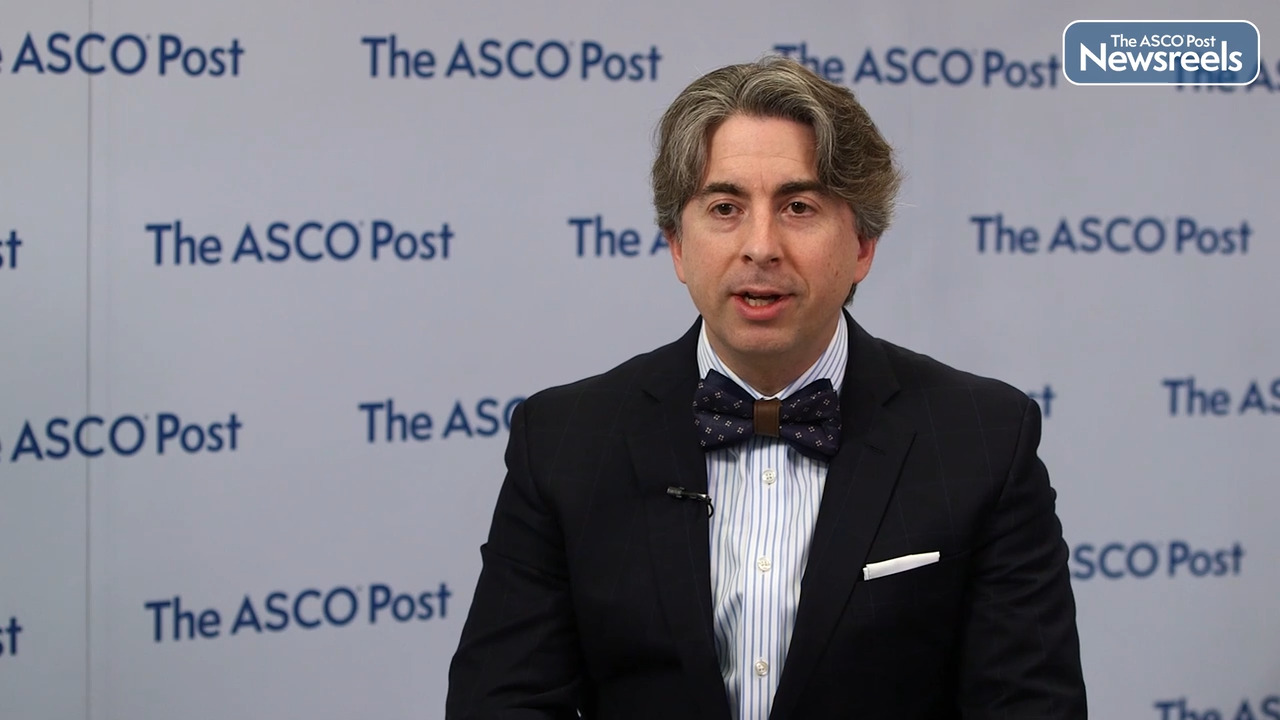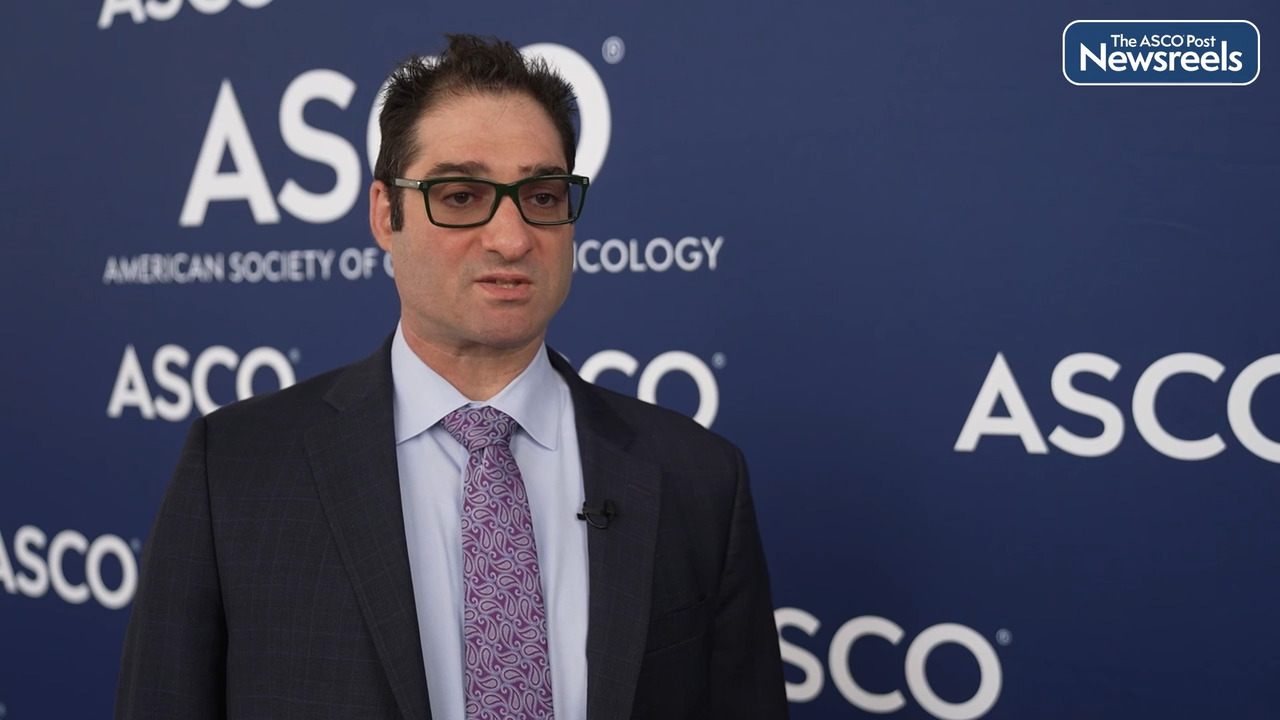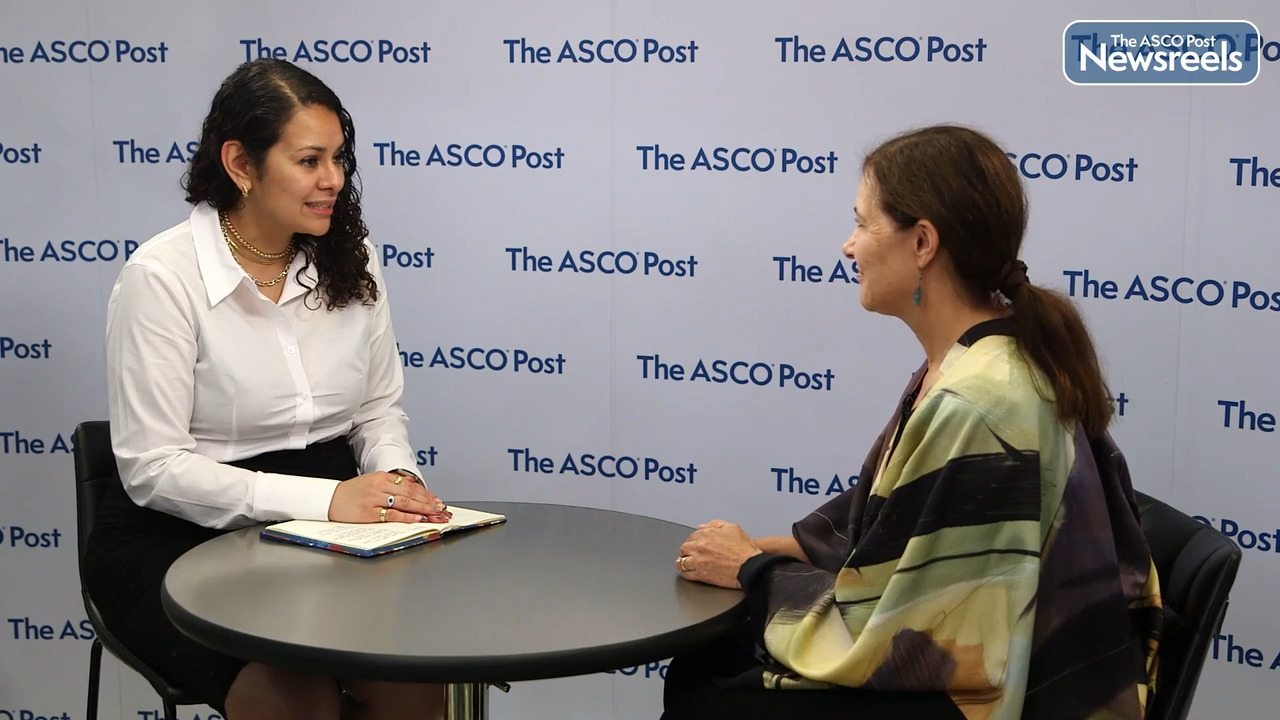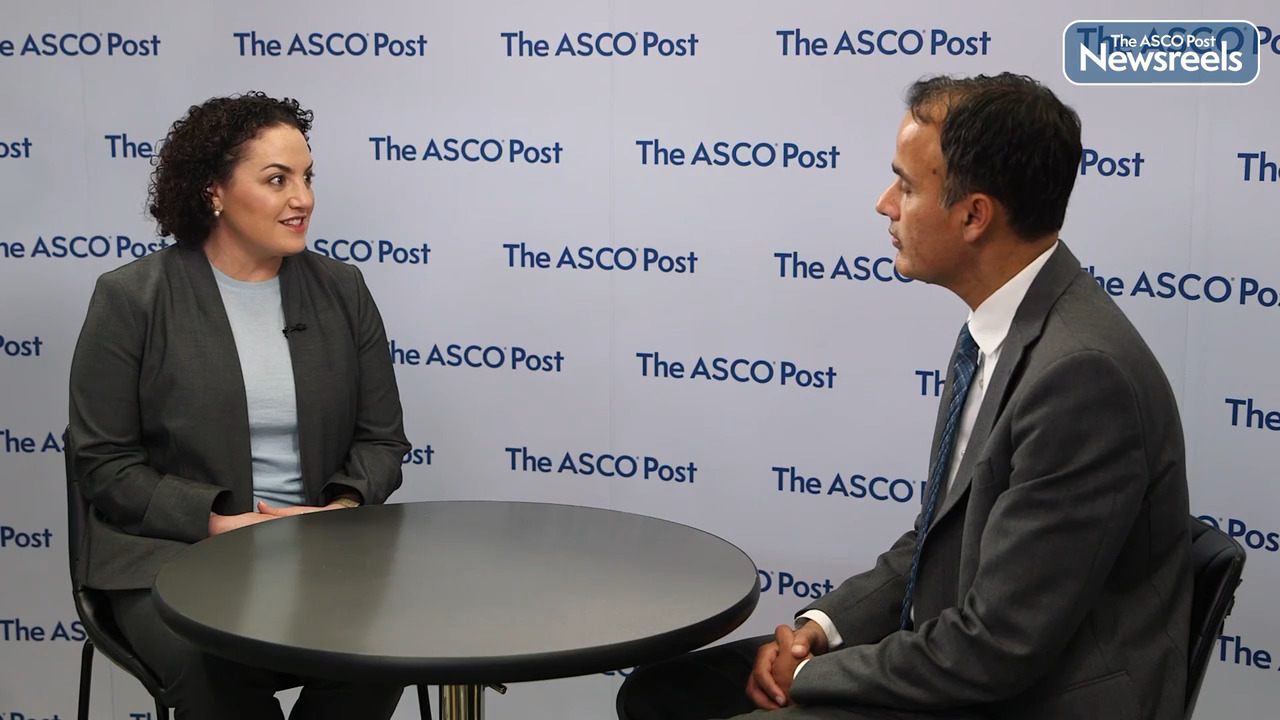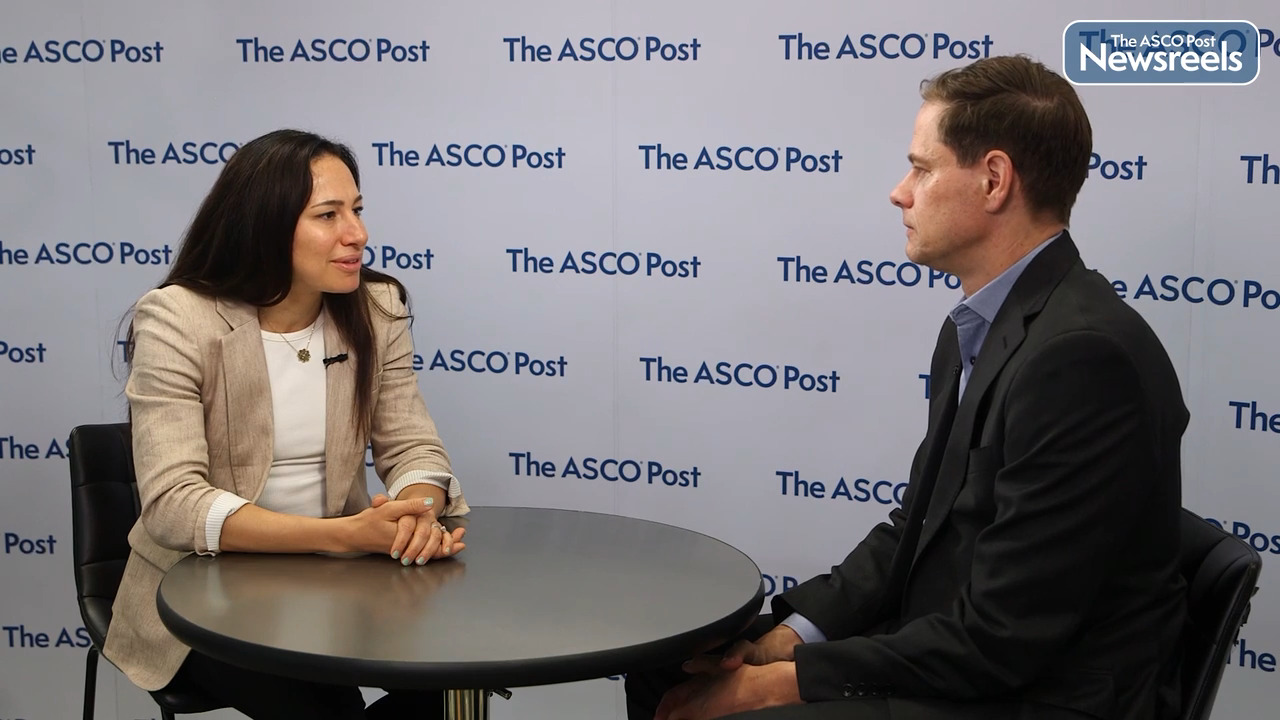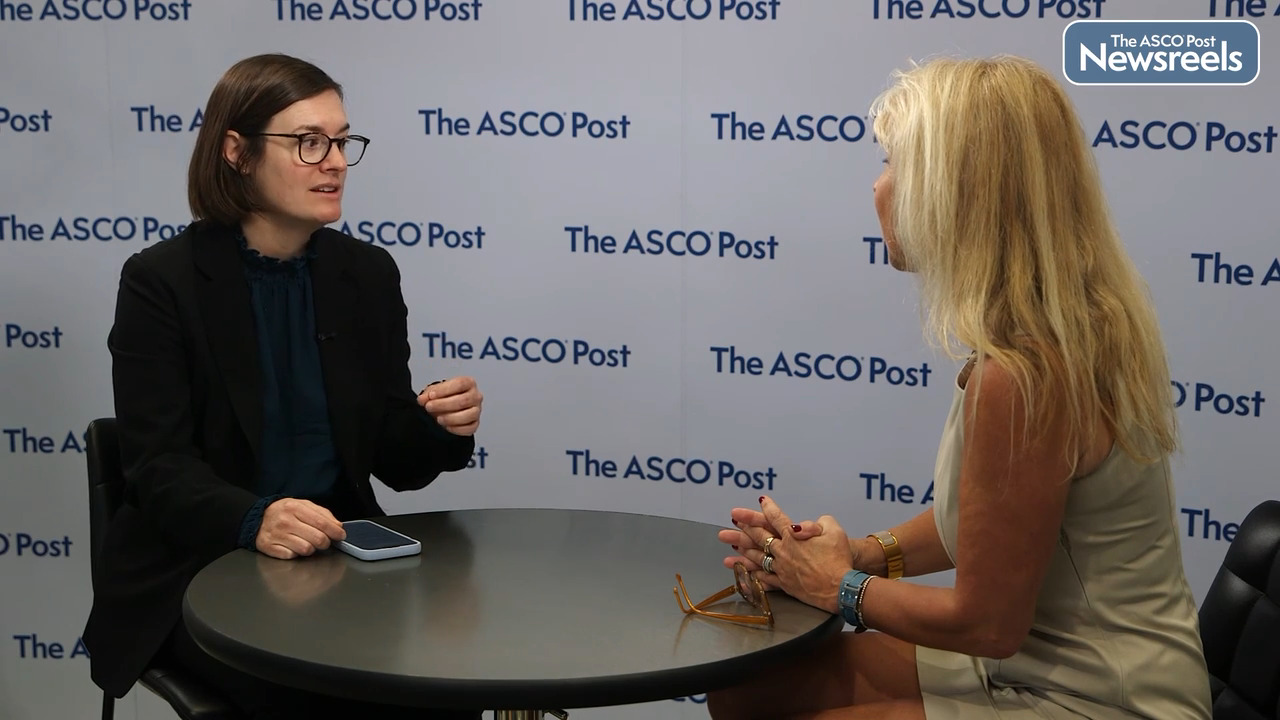Blinatumomab Improves Survival in MRD-Negative, B-Cell ALL
The standard of care could be changing for adults with newly diagnosed BCR-ABL–negative B-lineage acute lymphoblastic leukemia (ALL) who achieve measurable residual disease (MRD) negativity after induction chemotherapy. In the phase III E1910 trial by the ECOG-ACRIN Cancer Research Group, an...
T-Cell Tolerant Fraction May Predict Immune-Related Adverse Events Among Patients Receiving Immunotherapy
Researchers have identified a novel parameter of T cells that may help oncologists anticipate which patients are most likely to develop immunotherapy toxicity. The findings, published by Ostmeyer in the Journal for ImmunoTherapy of Cancer, could lead to improved treatments for a variety of ...
Are Immune Checkpoint Inhibitors Efficacious Among Patients With Penile Squamous Cell Carcinoma?
Penile squamous cell carcinoma is a rare type of penile cancer with limited treatment options. An international study has found that the use of immune checkpoint inhibitors may offer clinical benefits for some patients with advanced penile squamous cell carcinoma. These findings were published by...
CAR T-Cell Therapies: Trends and Indications
The ASCO Post is pleased to present Hematology Expert Review, an ongoing feature that quizzes readers on issues in hematology. With this installment, we launch a new series of articles on commercially available chimeric antigen receptor (CAR) T-cell therapies. Syed Ali Abutalib, MD, and Jennifer N. ...
Researchers Characterize Adverse Immune Events in Patients With Cancer Who Experience Immune Checkpoint Inhibitor–Associated Arthritis
Researchers may have uncovered the immune adverse events and the specific type of CD8 T cells that characterize inflammatory arthritis induced by immune checkpoint inhibitors, according to a recent study published by Wang et al in Science Immunology. Immune checkpoint inhibitors used to treat...
Matthew J. Frank, MD, PhD, on Large B-Cell Lymphoma: New Data on CD22 CAR T-Cell Therapy
Matthew J. Frank, MD, PhD, of Stanford University School of Medicine, discusses new findings showing that CD22 chimeric antigen receptor (CAR) T-cell therapy is an effective and safe salvage therapy for patients with CAR19-refractory large B-cell lymphoma. A multicenter phase II clinical trial is planned for 2023 (Abstract S230).
Ciltacabtagene Autoleucel vs Standard Care in Patients With Lenalidomide-Refractory Multiple Myeloma
In the phase III CARTITUDE-4 trial reported in The New England Journal of Medicine, San-Miguel et al found that receipt of ciltacabtagene autoleucel following bridging therapy significantly improved progression-free survival vs standard care in patients with lenalidomide-refractory multiple...
Niraparib Maintenance in Newly Diagnosed Advanced Ovarian Cancer
In a Chinese phase III study reported in JAMA Oncology, Li et al found that niraparib maintenance therapy given with an individualized starting dose improved progression-free survival vs placebo in newly diagnosed patients with advanced ovarian cancer. Study Details In the double-blind multicenter...
Addition of Nivolumab to SABR in Early-Stage or Isolated Lung Parenchymal Recurrent NSCLC
In the phase II I-SABR trial reported in The Lancet, Chang et al found that the addition of nivolumab to stereotactic ablative radiotherapy (SABR) improved event-free survival in patients with previously untreated stage I or II or isolated parenchymal recurrent node-negative non–small cell lung...
Expert Point of View: Barbara Pistilli, MD
Barbara Pistilli, MD, Head of the Breast Cancer Unit in the Medical Oncology Department of Gustave Roussy Cancer Center, Villejuif, France, was invited to discuss the TROPiCS-02 updated analysis. She began by pointing out that the target landscape of antibody-drug conjugates is “expanding...
Extended Follow-up of TROPiCS-02 Trial: Sacituzumab Govitecan in Metastatic Breast Cancer
Additional follow-up of the phase III TROPiCS-02 trial has upheld the progression-free and overall survival benefit seen with sacituzumab govitecan-hziy compared with physician’s choice of treatment in patients with endocrine-resistant, hormone receptor–positive, HER2-negative metastatic breast...
Omitting Mediastinal Radiotherapy in Some Patients With Primary Mediastinal B-Cell Lymphoma After Immunochemotherapy
In the largest prospective study of patients with primary mediastinal B-cell lymphoma, radiation therapy was omitted in complete responders to immunochemotherapy without compromising outcomes. These findings were presented at the 2023 ASCO Annual Meeting.1 “Mediastinal radiotherapy may be safely...
Addition of SBRT to Immunotherapy in Advanced Solid Tumors
In the Belgian phase II CHEERS trial reported in JAMA Oncology, Spaas et al evaluated the addition of stereotactic body radiotherapy (SBRT) to anti–PD-1/PD-L1 immune checkpoint inhibitor therapy, with SBRT directed to a maximum of three lesions, in patients with advanced solid tumors. The...
Overall Survival With Axicabtagene Ciloleucel in Large B-Cell Lymphoma: Results From ZUMA-7
As reported in The New England Journal of Medicine by Jason R. Westin, MD, and colleagues, the overall survival analysis from the phase III ZUMA-7 trial showed significant benefit with axicabtagene ciloleucel vs standard care in patients with early relapsed or refractory large B-cell lymphoma. The...
Current Management of and Future Possibilities for Triple-Negative Breast Cancer
“Triple-negative breast cancer remains the most challenging subtype to treat because of its aggressive phenotype and limited treatment options,” stated Erica Michelle Stringer-Reasor, MD, who spoke at an education session on current approaches to treatment and future directions during the 2023 ASCO ...
Activity and Toxicity of Pembrolizumab in Rare Sarcomas
In a French phase II basket trial (AcSé Pembrolizumab) reported in The Lancet Oncology, Jean-Yves Blay, MD, and colleagues investigated the activity and safety of pembrolizumab in patients with rare sarcomas. AcSé Pembrolizumab is an ongoing phase II multitumor study investigating the activity of...
Expert Point of View: Barbara Burtness, MD
Barbara Burtness, MD, the Anthony N. Brady Professor of Medicine and Chief Translational Research Officer at Yale Cancer Center, New Haven, featured the CONTINUUM study at the head and neck cancer session on Highlights of the Day during the 2023 ASCO Annual Meeting. She noted the study’s premise...
CONTINUUM: In Locally Advanced Nasopharyngeal Cancer, Addition of Sintilimab to Chemoradiotherapy Offers Benefit
The addition of the PD-1 inhibitor sintilimab to standard induction chemotherapy and chemoradiotherapy resulted in a significant improvement in 3-year event-free survival, a manageable safety profile, and comparable quality of life in high-risk, locally advanced nasopharyngeal carcinoma vs standard ...
Adjuvant Nivolumab vs Observation for Patients With Completely Resected Merkel Cell Carcinoma
As reported in The Lancet by Becker et al, an interim analysis of a European phase II study (ADMEC-O) showed that adjuvant nivolumab was associated with a numeric benefit in disease-free survival vs observation in patients with completely resected Merkel cell carcinoma. Study Details In the...
First-Line Pembrolizumab/Lenvatinib in Advanced Non–Clear Cell Renal Cell Carcinoma
In the phase II KEYNOTE-B61 trial reported in The Lancet Oncology, Laurence Albiges, MD, PhD, and colleagues found that first-line pembrolizumab plus lenvatinib produced durable responses in patients with advanced non–clear cell renal cell carcinoma. As stated by the investigators,...
Addition of Atezolizumab to Cabozantinib in Renal Cell Carcinoma Progressing During or After Prior Immune Checkpoint Inhibition
In the phase III CONTACT-03 trial reported in The Lancet, Sumanta Pal, MD, FASCO, and colleagues found that the addition of atezolizumab to cabozantinib did not improve outcomes in patients with renal cell carcinoma whose disease progressed on or after prior immune checkpoint inhibitor treatment....
Crenigacestat Plus BCMA CAR T-Cell Therapy in Relapsed or Refractory Multiple Myeloma
In a single-institution, phase I, first-in-human trial reported in The Lancet Oncology, Cowan et al found that the combination of the γ-secretase inhibitor (GSI) crenigacestat and B-cell maturation antigen (BCMA) chimeric antigen receptor (CAR) T-cell therapy was tolerable and produced a high...
Changing How Immune Checkpoint Inhibitors Are Delivered Could Reduce Costs by 14%, Study Finds
Investigators have found that millions of dollars could be saved annually across the Veterans Health Administration by reconsidering how immune checkpoint inhibitors are delivered, according to a new study published by Bryant et al in Health Affairs. The findings suggested that if vials of immune...
Expert Point of View: Erminia Massarelli, MD, PhD, MS
The invited discussant of the VERSATILE-002 and CUE-101-01 trials, Erminia Massarelli, MD, PhD, MS, said both are examples of a growing interest in evaluating immunotherapeutic strategies and treatment sequences in early-stage head and neck squamous cell cancer as well as in metastatic disease. Dr. ...
Novel HPV-Targeted Agents Boost Efficacy of Pembrolizumab in Head and Neck Cancer, Two Studies Show
Immunotherapeutics that target human papillomavirus (HPV) genotype 16 appear to boost the activity of pembrolizumab in advanced head and neck squamous cell carcinoma. Two examples were presented in posters at the 2023 ASCO Annual Meeting.1,2 The phase II VERSATILE-002 trial evaluated PDS0101,...
Epcoritamab-bysp in Treatment of Relapsed or Refractory B-Cell Lymphomas
On May 19, 2023, epcoritamab-bysp was granted accelerated approval by the U.S. Food and Drug Administration for treatment of relapsed or refractory diffuse large B-cell lymphoma (DLBCL)–not otherwise specified, including DLBCL arising from indolent lymphoma, and high-grade B-cell lymphoma after two ...
Addition of Tislelizumab to Chemotherapy Improves Survival in Treatment of Metastatic Esophageal Squamous Cell Carcinoma
As reported in The Lancet Oncology by Jianming Xu, MD, of Fifth Medical Center, Chinese PLA General Hospital, Beijing, corresponding author Harry H. Yoon, MD, of the Department of Oncology, Mayo Clinic, Rochester, and colleagues, an interim analysis of the phase III RATIONALE-306 trial has shown...
Addition of Neoadjuvant Nivolumab to Platinum-Based Chemotherapy in Stage III NSCLC
In the Spanish phase II NADIM II trial reported in The New England Journal of Medicine, Mariano Provencio, MD, PhD, and colleagues found that the addition of nivolumab to platinum-based chemotherapy improved pathologic complete response (pCR) rates among patients with resectable stage IIIA or IIIB...
First-Line Enfortumab Vedotin Plus Pembrolizumab in Cisplatin-Ineligible Patients With Locally Advanced or Metastatic Urothelial Cancer
As reported in the Journal of Clinical Oncology by O’Donnell et al, findings in a cohort of the phase Ib/II EV-103/KEYNOTE-869 study showed durable responses with first-line enfortumab vedotin-ejfv plus pembrolizumab in cisplatin-ineligible patients with locally advanced or metastatic urothelial...
TROP-2–Directed Antibody-Drug Conjugate Datopotamab Deruxtecan in Advanced NSCLC
In a phase I study (TROPION-PanTumor01) reported in the Journal of Clinical Oncology, Shimizu et al described outcomes with the trophoblast cell-surface antigen 2 (TROP-2)-directed antibody-drug conjugate datopotamab deruxtecan at the dose selected for further development in patients with advanced...
Long-Term Survival Outcomes With Pembrolizumab vs Ipilimumab in Advanced Melanoma: 7-Year Follow-up of KEYNOTE-006
As reported in the Journal of Clinical Oncology by Caroline Robert, MD, PhD, and colleagues, the 7-year follow-up of the phase III KEYNOTE-006 trial has shown a continued overall survival benefit with pembrolizumab vs ipilimumab in patients with advanced melanoma. The primary analysis of the trial...
T-DXd in HER2-Positive Advanced Gastric or Gastroesophageal Junction Cancer: DESTINY-Gastric02
In the phase II DESTINY-Gastric02 trial reported in The Lancet Oncology, Eric Van Cutsem, MD, PhD, and colleagues found that fam-trastuzumab deruxtecan-nxki (T-DXd) was active in patients with HER2-positive advanced gastric or gastroesophageal junction cancer with disease progression on or after a...
Immune Checkpoint Inhibitors Show Promise for People Living With HIV
New research involving people living with HIV treated with immune checkpoint inhibitors has provided valuable insights into the safety and efficacy of immunotherapy in this historically excluded population, according to data published in the Journal of Clinical Oncology.1 The real-world data...
Expert Point of View: Zeynep Eroglu, MD
The formal discussant of the phase II SWOG S1512 trial was Zeynep Eroglu, MD, of the Department of Cutaneous Oncology at the Moffitt Cancer Center in Tampa, Florida. She congratulated Dr. Kendra and her coauthors for conducting a study in such a rare tumor. “I think we can say desmoplastic melanoma ...
SWOG S1512 Trial: Pembrolizumab Achieves High Response Rates in Rare Type of Melanoma
The immune checkpoint inhibitor pembrolizumab achieved high response rates in patients with unresectable metastatic desmoplastic melanoma, a rare invasive tumor type, according to the results of the phase II SWOG S1512 trial presented at the 2023 American Association for Cancer Research (AACR)...
First-Line Nivolumab/Ipilimumab Followed by Nivolumab in a Clinically Diverse Population With Unresectable Stage III or IV Melanoma
In the phase IIIb CheckMate 401 trial reported in the Journal of Clinical Oncology, Reinhard Dummer, MD, and colleagues described outcomes with first-line nivolumab/ipilimumab followed by nivolumab in a clinically diverse population of patients with unresectable stage III or IV melanoma, including...
Shailender Bhatia, MD, on Merkel Cell Carcinoma: Results From CheckMate 358 on Nivolumab With or Without Ipilimumab
Shailender Bhatia, MD, of the University of Washington and Fred Hutchinson Cancer Center, discusses phase I/II results on the efficacy of nivolumab with or without ipilimumab in patients with recurrent or metastatic Merkel cell carcinoma. The study found that, for this rare and aggressive skin cancer, nivolumab showed clinical activity in advanced disease. However, these results from CheckMate 358 do not suggest an additional benefit with ipilimumab added to nivolumab (Abstract 9506).
FDA Grants Accelerated Approval to Glofitamab-gxbm for Relapsed or Refractory DLBCL
On June 15, the U.S. Food and Drug Administration (FDA) granted accelerated approval to glofitamab-gxbm (Columvi) for the treatment of adult patients with relapsed or refractory diffuse large B-cell lymphoma (DLBCL) not otherwise specified or large B-cell lymphoma arising from follicular lymphoma,...
Stopping Immunotherapy After 2 Years vs Continuing Treatment May Yield Similar Survival Outcomes in Patients With Advanced NSCLC
Patients with advanced non–small cell lung cancer (NSCLC) may be able to stop receiving immunotherapy at 2 years as long as their cancer hasn’t progressed, according to new findings presented by Sun et al at the 2023 ASCO Annual Meeting (Abstract 9101) and simultaneously published in JAMA Oncology. ...
Axicabtagene Ciloleucel Improves Overall Survival in Patients With Relapsed or Refractory Large B-Cell Lymphoma
Patients with early relapsed or refractory large B-cell lymphoma had significantly improved overall survival when treated with the chimeric antigen receptor (CAR) T-cell therapy axicabtagene ciloleucel when compared to the current standard-of-care chemoimmunotherapy, according to results of the...
Jason J. Luke, MD, on Melanoma Adjuvant Therapy: Final Analysis of KEYNOTE-716
Jason J. Luke, MD, of the University of Pittsburgh Medical Center Hillman Cancer Center, discusses adjuvant pembrolizumab, which, in previous results, improved distant metastasis– and recurrence-free survival in patients with resected stage IIB or IIC melanoma vs placebo. After a median follow-up of 39.4 months, adjuvant pembrolizumab continued to show a benefit over placebo, with no new safety signals (Abstract LBA9505).
Jonathan W. Riess, MD, on EGFR-Mutated Non–Small Cell Lung Cancer: What’s Next?
Jonathan W. Riess, MD, of the University of California, Davis Comprehensive Cancer Center, explores the findings of three important clinical trials in lung cancer treatment: whether to incorporate immune checkpoint inhibitors into the treatment of EGFR-mutated lung cancer, the importance of central nervous system activity in EGFR-mutant lung cancer, and new therapies for disease with EGFR exon 20 insertion.
Narjust Florez, MD, and Heather A. Wakelee, MD, on Early-Stage NSCLC: Phase III Findings From KEYNOTE-671 on Pembrolizumab and Platinum-Based Chemotherapy
Narjust Florez, MD, of Dana-Farber Cancer Institute, and Heather A. Wakelee, MD, of Stanford University, Stanford Cancer Institute, discuss new data supporting neoadjuvant pembrolizumab plus chemotherapy followed by surgery and adjuvant pembrolizumab as a promising new treatment option for patients with resectable stage II, IIIA, or IIIB (N2) non–small cell lung cancer (NSCLC) (Abstract LBA100).
Ciltacabtagene Autoleucel Reduces Risk of Disease Progression in Patients With Lenalidomide-Refractory Multiple Myeloma
Ciltacabtagene autoleucel, a B-cell maturation antigen–targeting chimeric antigen receptor (CAR) T-cell therapy, significantly slows or stops progression of multiple myeloma when compared with standard-of-care treatments among patients with lenalidomide-refractory disease. Results from the...
Allison Betof Warner, MD, PhD, and Adnan Khattak, PhD, MBBS, on High-Risk Resected Melanoma: Survival Results With mRNA-4157 and Pembrolizumab in KEYNOTE-942
Allison Betof Warner, MD, PhD, of Stanford University Medical Center, and Adnan Khattak, MBBS, FRACP, PhD, of Australia’s Hollywood Private Hospital & Edith Cowan University, discuss the use of the mRNA-4157 vaccine in combination with pembrolizumab as adjuvant therapy for resected high-risk melanoma, which prolonged distant metastasis–free survival compared with pembrolizumab alone. These results provide further evidence that a personalized neoantigen approach is potentially beneficial (Abstract LBA9503).
Rana R. McKay, MD, and Brian I. Rini, MD, on Clear Cell RCC: New Data From KEYNOTE-426 on Pembrolizumab Plus Axitinib vs Sunitinib
Rana R. McKay, MD, of the University of California, San Diego, and Brian I. Rini, MD, of Vanderbilt-Ingram Cancer Center, discuss the 5-year follow-up results with the combination of a checkpoint inhibitor plus a VEGFR tyrosine kinase inhibitor as first-line treatment for patients with advanced clear cell renal cell carcinoma (RCC). Pembrolizumab plus axitinib continued to demonstrate improved survival outcomes as well as overall response rate vs sunitinib for patients with previously untreated disease (Abstract LBA4501).
Study Finds T-DXd Effectively Treats HER2-Expressing Cancers, Regardless of Tumor Location
According to the findings of the international phase II DESTINY-PanTumor02 study presented by Funda Meric-Bernstam, MD, and colleagues at the 2023 ASCO Annual Meeting, fam-trastuzumab deruxtecan-nxki (T-DXd) is an effective treatment option for people with difficult-to-treat, HER2-expressing solid...
Bobbie J. Rimel, MD, Isabelle L. Ray-Coquard, MD, PhD, on Cervical Squamous Carcinoma: Neoadjuvant Nivolumab Plus Ipilimumab
Bobbie J. Rimel, MD, of Cedars-Sinai Medical Center, and Isabelle L. Ray-Coquard, MD, PhD, of Centre Léon Bérard and the University Claude Bernard Lyon Est, discuss findings from the COLIBRI trial, which showed that, for patients with cervical squamous cell carcinoma, neoadjuvant nivolumab plus ipilimumab is safe and orchestrates de novo immune responses. The 82.5% complete response rate for primary tumors 6 months after standard chemoradiation therapy suggests favorable clinical outcomes (Abstract 5501).
Georgina V. Long, MD, PhD, on Resected Melanoma: Biomarkers for and Efficacy of Adjuvant Nivolumab vs Placebo
Georgina V. Long, MD, PhD, of Melanoma Institute Australia and The University of Sydney, discusses new data showing that patients with resected stage IIB/C melanoma who were treated with adjuvant nivolumab had prolonged recurrence-free survival compared with placebo across all biomarker subgroups. The baseline biomarkers most predictive of prolonged recurrence-free survival with nivolumab were high interferon gamma score, high tumor mutational burden, CD8 T-cell infiltration, and low C-reactive protein (Abstract 9504).
Omid Hamid, MD, on Advanced Melanoma: Durable Response With Fianlimab Plus Cemiplimab
Omid Hamid, MD, of The Angeles Clinic & Research Institute, discusses study findings on fianlimab plus cemiplimab-rwlc, which showed clinical activity in patients with advanced melanoma, comparing favorably with other approved combinations of immune checkpoint inhibitors in the same clinical setting. This is the first indication that dual LAG-3 blockade may produce a high level of activity with significant overall response rate after adjuvant anti–PD-1 treatment. A phase III trial of this regimen in treatment-naive patients with advanced melanoma is ongoing (Abstract 9501).


